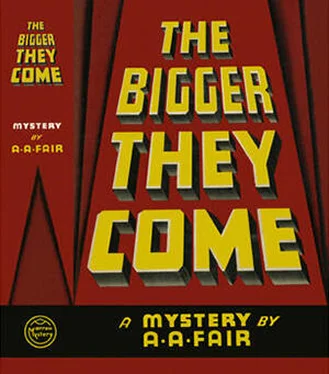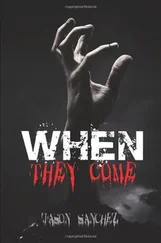A. Fair - The Bigger They Come
Здесь есть возможность читать онлайн «A. Fair - The Bigger They Come» весь текст электронной книги совершенно бесплатно (целиком полную версию без сокращений). В некоторых случаях можно слушать аудио, скачать через торрент в формате fb2 и присутствует краткое содержание. Город: New York, Год выпуска: 1939, Издательство: William Morrow, Жанр: Классический детектив, на английском языке. Описание произведения, (предисловие) а так же отзывы посетителей доступны на портале библиотеки ЛибКат.
- Название:The Bigger They Come
- Автор:
- Издательство:William Morrow
- Жанр:
- Год:1939
- Город:New York
- ISBN:нет данных
- Рейтинг книги:3 / 5. Голосов: 1
-
Избранное:Добавить в избранное
- Отзывы:
-
Ваша оценка:
- 60
- 1
- 2
- 3
- 4
- 5
The Bigger They Come: краткое содержание, описание и аннотация
Предлагаем к чтению аннотацию, описание, краткое содержание или предисловие (зависит от того, что написал сам автор книги «The Bigger They Come»). Если вы не нашли необходимую информацию о книге — напишите в комментариях, мы постараемся отыскать её.
open this door when you want to play fair with the most original pair of detectives of years — and will keep the secret that is going to make detective-story history — the secret of
The Bigger They Come — читать онлайн бесплатно полную книгу (весь текст) целиком
Ниже представлен текст книги, разбитый по страницам. Система сохранения места последней прочитанной страницы, позволяет с удобством читать онлайн бесплатно книгу «The Bigger They Come», без необходимости каждый раз заново искать на чём Вы остановились. Поставьте закладку, и сможете в любой момент перейти на страницу, на которой закончили чтение.
Интервал:
Закладка:
‘But what does that have to do with it?’ the judge asked. ‘You have admitted killing a man in California.’
‘Certainly, I killed him. He deserved to die. He was a rat and a double-crosser. But that isn’t the question before this court. The question before this court is whether I can be extradited to California. I can’t be extradited to California. The only authority which one state has to take prisoners from another state comes from the organic law which provides that fugitives from justice may be extradited from one sovereign state to another. I am not a fugitive from justice.’
‘If you’re not a fugitive from justice, I don’t know what you are,’ Judge Oliphant said.
‘I don’t need to argue the matter,’ I retorted, ‘for two reasons. One of them is that your honor’s mind is evidently made up, and the other is that better legal minds than I have already wrestled with the problem. The fact remains, however, that a man is not a fugitive from a state unless he flees from that state. He doesn’t flee from that state unless he does so voluntarily and in order to avoid arrest. I did not flee from California. I was dragged from California. I was taken out under legal process to answer for a crime of which I was innocent. I claimed that I was innocent. I came to Arizona and established my innocence. Any time I get good and ready to go back to California, California can arrest me for murder. Until I get good and ready to go back, I can stay here and no power on earth can make me budge.’
The judge was looking interested now. ‘When you mention that more learned minds than yours have considered the question, are you, by any chance, referring to some judicial precedent?’
‘I am, your honor. The case of In re Whittington, 34C.A.334, is a leading case and absolutely in point. I can also refer you to the case of People vs. Jones, S4C.A.423. The California doctrine has been succintly expressed in Volume 12 California jurisprudence, page 398, as follows: “Where it appears that the presence of the accused in the state of refuge is not due to any voluntary act of his own, but to legal or illegal compulsion, he is not a fugitive from justice and cannot be extradited as such. Thus where it is shown that his presence in the state of refuge is due to extradition proceedings instituted by that state itself for a previous crime and honored by the state now demanding his return, he cannot be extradited by the latter, both because he did not flee from it, and because, by honoring the first requisition, it waived any right to prosecute him for the offense committed against its laws.’
The judge sat staring at me incredulously. The district attorney got to his feet, and said, ‘Surely, your honor, that cannot be the law. If such were the law, any man could commit murder, with malice aforethought. He could coldly, deliberately, and feloniously kill another human being; then, by taking advantage of a legal loophole, avoid any punishment.’
Judge Oliphant said slowly, ‘And apparently that is exactly what the petitioner in this case has done. It needs no great imagination to realize that, step by step, he had embarked upon a course of carefully planned murder with diabolical ingenuity. If this is the law, this man has committed the perfect crime, not as it is usually planned, with such subtlety that the clues are completely concealed, but with such ingenuity that he cannot be punished. It is to be noted that the petitioner has memorized the text of that portion of California jurisprudence dealing with the point he is making: It is, therefore, readily apparent that the full possibilities of the situation have been carefully thought out by him well in advance. The entire history of this case indicates that the petitioner is possessed of an astute legal mind which, unfortunately, is not balanced by a corresponding sense of legal ethics. However much the court may deplore the latter, it cannot ignore the consummate brilliance with which this petitioner, frail in his physical appearance, apparently young, innocent and inexperienced, has jockeyed the authorities of two states into such a position that they are apparently powerless to punish him for a cold-blooded, premeditated, and deliberate murder, his part in which he has brazenly admitted. It is an astounding situation. To some extent, the defendant’s moral and legal lapse is atoned by his confession which has enabled the California authorities to arrest the petitioner’s accomplices. However, the fact remains that the petitioner at bar, despite his very apparent youth and inexperience, has the ability to discover, and the ingenuity to carry into execution, a scheme by which he has adroitly outwitted the sovereign authorities of two states. It is a most astounding situation.
‘The court will take a thirty-minute recess during which the court will endeavour to consider this matter with a fair and impartial mind. However, the court cannot remain unaware of the seriousness of leaving such a legal loophole in our social and legislative structure. The court will not construe the organic law cited by the petitioner in the light of the petitioner’s contention unless it appears that the State of California has estopped itself from asking for a different construction by a decision which is plain and unequivocal in its language.’
Judge Oliphant got up and walked gravely into chambers. I sat there waiting in the courtroom. After a few moments, the sheriff said, ‘This way, Donald.’
He took me into his office. I sat there waiting. The district attorney came in and looked at me as though I was something other than human.
At the end of half an hour, the sheriff took me back into court. Judge Oliphant came in and took his seat on the bench. His shoulders were sagging. He looked down at the district attorney, and said, ‘The court has no other alternative. The law in this case is exactly as contended by the petitioner. Under this law a man could — and has — committed a cold-blooded murder with complete legal immunity. Posing as a not-too-bright young criminal, he has victimized the law itself. There can be no question in the mind of the court but what the shrewd and unscrupulous intelligence of the petitioner in this case has carefully planned each step in a well-laid campaign. However, there is no legal proof before the court indicating that such is the case. The California decisions cited by the petitioner are absolutely in point. In view of the interpretation which has been placed upon the law by the courts of California, it would be idle to contend for any other interpretation. California has passed upon the matter, and the California courts have precluded themselves from seeking any other interpretation of the law. California cannot extradite this man. The petitioner is discharged from custody, much as the court regrets the necessity of making such a decision.’
The district attorney said, ‘Your honor, we don’t need to believe his story. We can hold him for further developments. Perhaps he—?’
‘Apparently you don’t appreciate the diabolical ingenuity of the petitioner’s position,’ Judge Oliphant said. ‘He can’t be extradited from Arizona. He isn’t a fugitive from justice ― not from California at any rate. I doubt if there is enough evidence to connect him with this Kansas City crime. If there is, there will be little difficulty in finding the petitioner. He certainly is not going to leave the State of Arizona. Here he enjoys legal immunity. Elsewhere, he would not, and the perspicacity of this petitioner is such that he not only realizes that fact but will take full technical advantage of it. I even doubt if he could be extradited to Kansas City. The petitioner is discharged.’
A slow murmur grew in volume from the crowd in the courtroom. It was not a hostile murmur. It was a murmur of surprise and of interest. Had an attorney been representing me, I probably would have been lynched. As it was, I had been the underdog, standing alone and unaided at the bar of justice. I had forced the judge to accept my interpretation of the law and had whipped the astounded district attorney to a standstill.
Читать дальшеИнтервал:
Закладка:
Похожие книги на «The Bigger They Come»
Представляем Вашему вниманию похожие книги на «The Bigger They Come» списком для выбора. Мы отобрали схожую по названию и смыслу литературу в надежде предоставить читателям больше вариантов отыскать новые, интересные, ещё непрочитанные произведения.
Обсуждение, отзывы о книге «The Bigger They Come» и просто собственные мнения читателей. Оставьте ваши комментарии, напишите, что Вы думаете о произведении, его смысле или главных героях. Укажите что конкретно понравилось, а что нет, и почему Вы так считаете.












